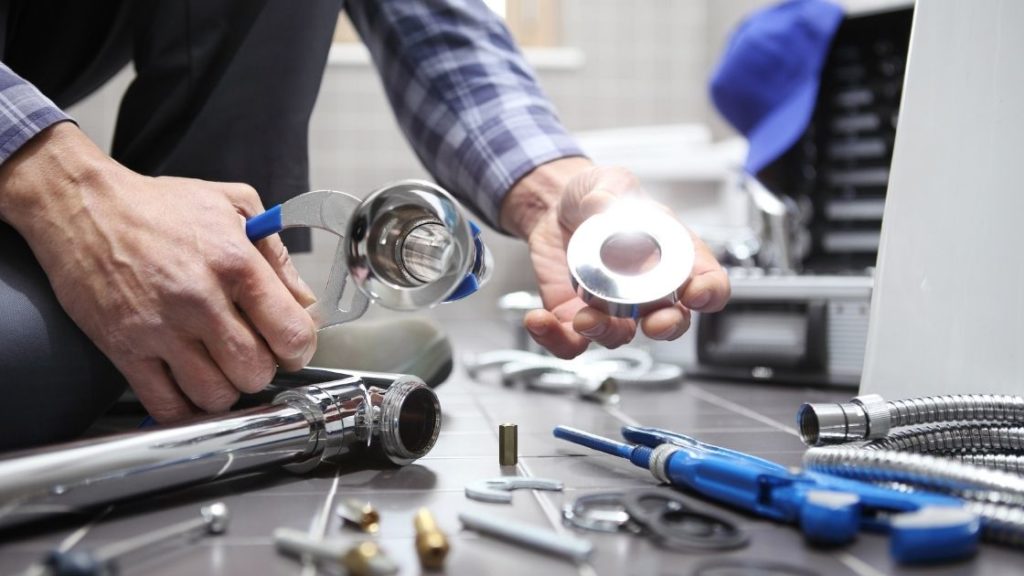Plumbing contractors perform a wide variety of work, from making residential service calls to subcontracting on large commercial projects. One day you may be repairing a burst pipe, and the next installing a new dishwasher. It’s a job that requires a great deal of training, flexibility and patience.
Plumbing has its rewards – and its risks. You could be cleaning a sewer line, connecting a gas stove, or on your back all day under a sink. There are risks of injury, liability if you make a mistake, and property damage if something happens to your truck or tools.
You need insurance to protect your business, your employees and your customers. An experienced insurance professional who knows the plumbing business can help you select the coverage that’s right for you.
Commercial general liability insurance is a must
Because you service customers and work on their premises, liability is a major risk. A customer trips over a pipe you’re installing and breaks a leg, a valve you worked on fails and water floods an apartment, or a drain you cleaned backs up into a customer’s basement. All of these scenarios could result in expensive claims or litigation. And all could be covered by a commercial general liability (CGL) policy.
CGL insurance protects you against liability for bodily injury, property damage, medical expenses, advertising injury (e.g., someone claims you have said something untrue and damaging about them in your marketing materials) and personal injury stemming from the operation of your business. These events might occur on your own premises or at a customer’s home or business. However, CGL won’t cover injuries to you or your employees. These would be covered by your workers’ compensation insurance.
Because liability claims can lead to lawsuits and costly settlements, most businesses make this coverage the centerpiece of their insurance program. In addition, many project owners will insist that you have CGL and ask for proof of insurance. Banks and creditors want to see evidence of coverage as well.
CGL is but one type of liability coverage. You may also need professional liability insurance and employment practices liability insurance (EPLI). We’ll cover those next.
For all types of liability coverage, you must decide how high the limits should be for your business – that is, what is the most a policy will pay per occurrence and in the aggregate during the insurance period (usually one year).
You also must decide whether your coverage will be “claims made,” meaning a claim is covered only if it is made while the policy is in force, or occurrence-based, meaning any incident that happens or happened during your policy period is covered, even if the claim is filed after you terminate that policy.
Premiums are based on your type of business, claims history, number of employees and whether you have adopted procedures to reduce your liability risk. Your insurance professional can discuss CGL options with you.

Professional and EPLI coverage
If you design and install the plumbing on a project, you may need professional liability insurance. Professional liability policies cover you against errors and omissions, i.e., mistakes or negligence on your part, that lead to injury or property damage.
For example, you might put a drain in the wrong place or forget to install a valve and waterline needed in a kitchen. Depending on the project, a simple oversight can cost thousands of dollars and could result in a lawsuit. Talk to your insurance professional about your liability exposure and the type of coverage you may need.
If you have employees, you could also be exposed to costly employment-related lawsuits. An employee could sue you for discrimination, sexual harassment, retaliation, wrongful termination, invasion of privacy, failure to promote, defamation or libel, or breach of employment contract. EPLI covers you from these types of claims and pays for your court costs and legal fees if you are sued.
Workers’ compensation insurance
Since nearly every state requires employers to have workers’ compensation insurance, you may already be familiar with this coverage. If you’re a sole proprietor or have only one or two employees, you may not need it. Check to see what your state requires.
Workers’ compensation covers a worker’s lost income and medical expenses if they are injured or become sick on the job. The injury has to be work-related and usually must occur on the job site. Your premiums are based on your number of employees, type of industry and claims history.
If you’re having trouble finding coverage in the standard workers’ compensation market, you may need to purchase coverage through your state’s assigned risk pool. These pools provide an alternative source of insurance for employers who have been declined due to high risk or frequent claims.
Insurance for your property, vehicles and equipment
You should also review your property insurance coverage. This includes the building you own or lease, your vehicles, your equipment and tools, and the material you store on premises or at your customer’s location. You will likely need to purchase at least these three main types of property insurance:
- Commercial property insurance – Similar to a homeowners policy but designed for businesses, this insurance covers your building and business property located at a fixed address. It protects against theft, vandalism, fire and various weather-related perils.
- Inland marine insurance – A specialty coverage for contractors that covers equipment, tools and material you transport to or store at a job site. Some commercial property policies provide limited protection for property in transit, so check with your insurance adviser or broker.
- Commercial auto insurance – A must if you have your own truck or fleet of vehicles, this coverage is similar to a personal auto policy. It provides liability, bodily injury and property coverage. Learn more about our commercial auto insurance here.
BOP plans to bundle coverage
One way to reduce your insurance purchases and save on premiums is to buy a business owners policy (BOP). BOPs bundle many of the separate coverages you need into one policy. The standard BOP has CGL insurance, commercial property insurance and business income insurance. Business income insurance pays for lost income if your business is interrupted by a fire or natural disaster and can’t operate.
BOPs can save you money, but they don’t always include the types of coverage and limits you need. Some insurers allow you to add extra coverage, or you might consider a commercial package policy (CPP). CPPs allow you to bundle the coverage you want and leave out what you don’t need. An insurance professional can explain how bundled policies work and help you decide if they are a good fit for you.
In addition to securing the right insurance coverage, you should work to reduce your risk exposure. Remember, not every risk can be insured and each policy has its limits and exclusions. That’s why it’s important to put safety first and stay up to date on your training and certifications. Sound risk management, coupled with good insurance coverage, will keep you protected and in a position to grow your business.
This content is for informational purposes only, should not be considered professional, financial, medical or legal advice, and no representations or warranties are made regarding its accuracy, timeliness or currency. With all information, consult with appropriate licensed professionals to determine if implementing any recommendations would be in accordance with applicable laws and regulations or to obtain advice with respect to any particular issue or problem.
Copyright © 2021 Applied Systems, Inc. All rights reserved.
Share this Post

